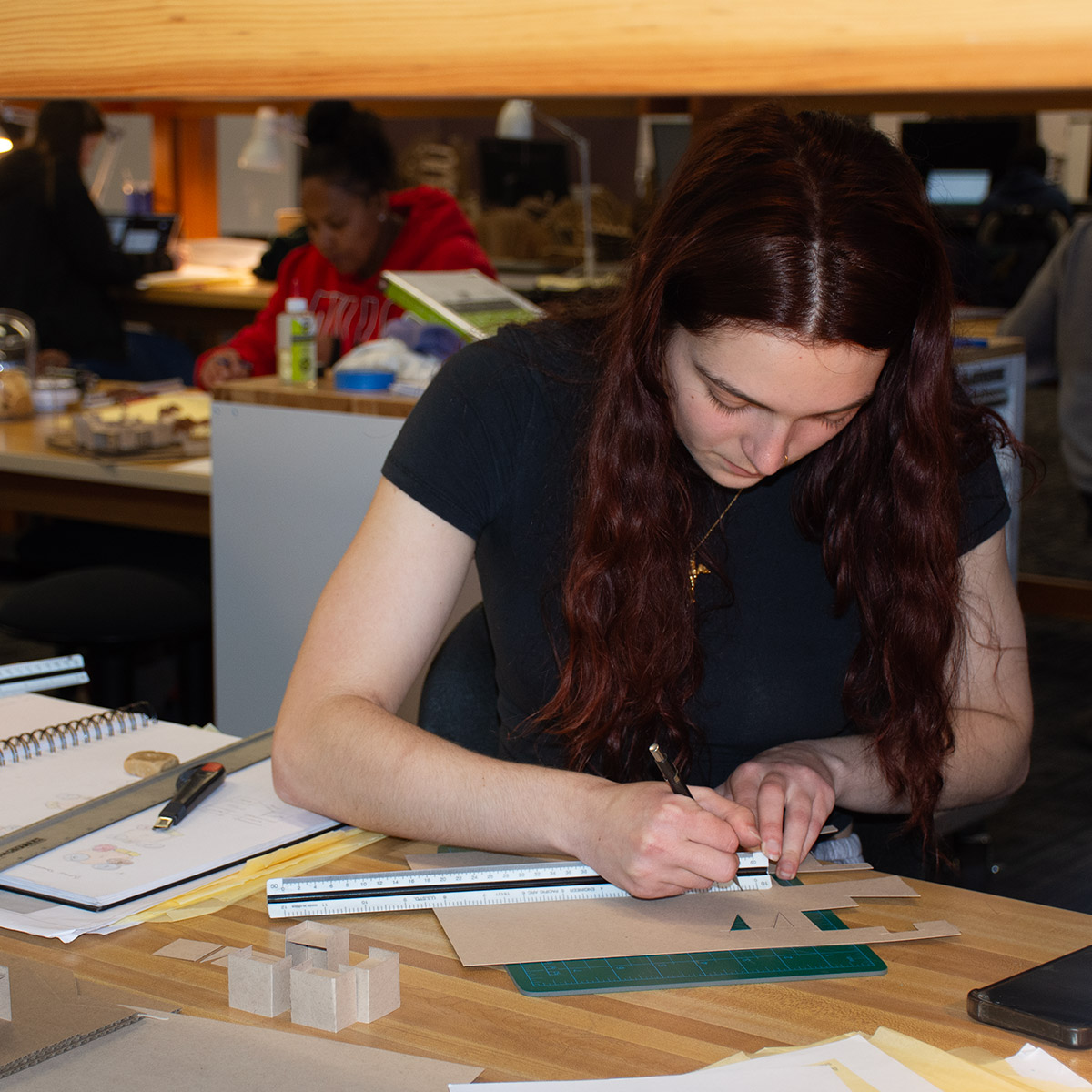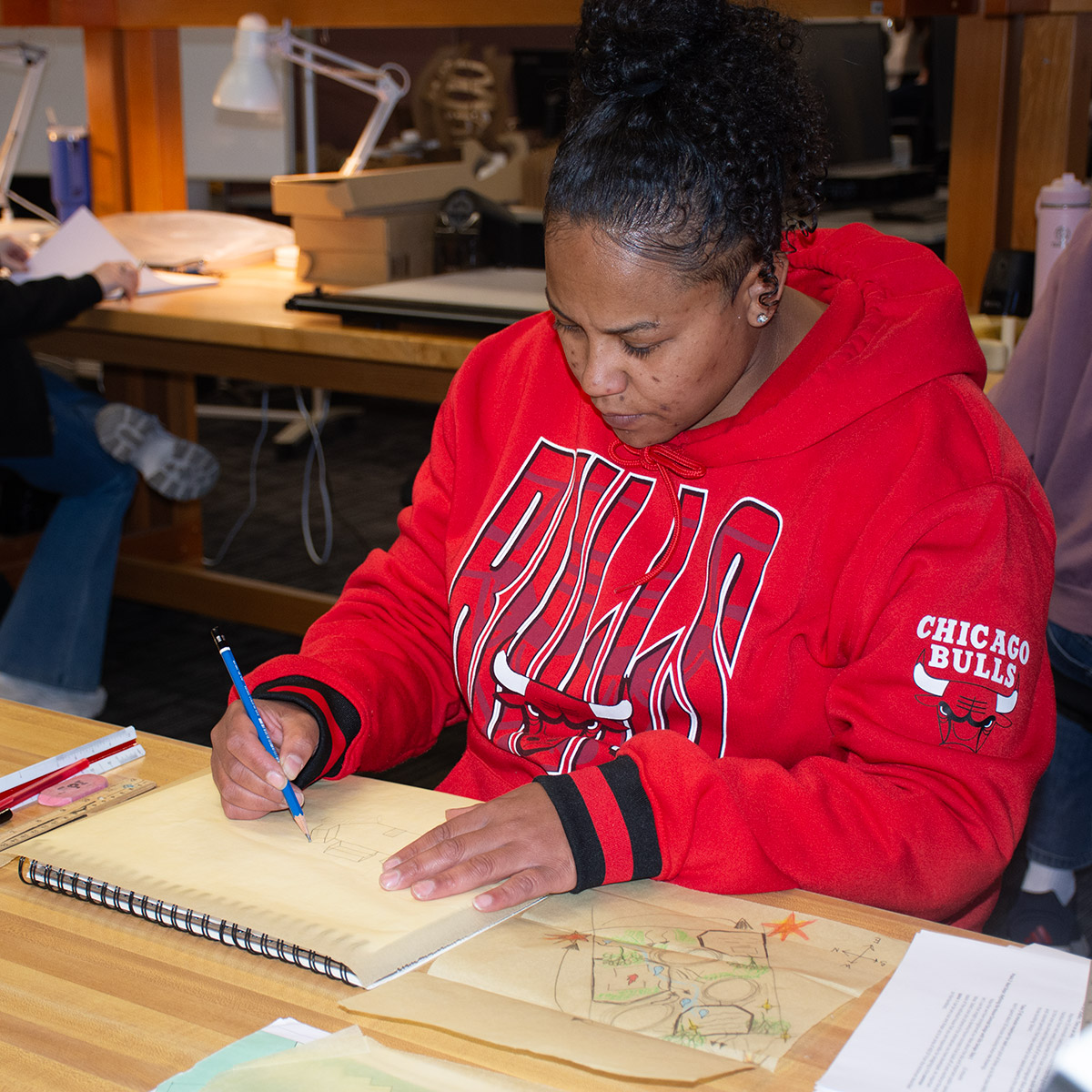Architectural Technologies
The Associate of Applied Science (A.A.S.) degree in architectural technologies prepares you for a career as an architectural technologist, whose primary role is in the development of detailed designs for the construction and renovation of buildings to meet the needs of a sustainable world.
The focus of the curriculum is on the knowledge base and decision-making processes involved with shaping building form and assembling architectural materials and components in a manner that supports minimal energy and resource consumption and produces functional, robust architecture.

The next generation of architectural designers will be challenged to give shape to a sustainable world. CCD’s architectural technology programs are designed to provide a springboard into a rewarding career, whether it involves transfer into a four-year degree program or direct employment within the design community as an architectural technologist paraprofessional.
CCD’s pathways offer a balance of technical skill training with the development of collaborative design-thinking abilities that are crucial to solving the complex range of today’s building tasks.
Areas of focus include:
- Digital technology competencies centered around Building Information Technologies (BIM) as the emerging professional standard for design documentation.
- Concurrent learning is structured around an understanding of how buildings go together—the material fabric of architecture and its assemblage—in a manner that conserves resources and supports sustainability.
- The history of our building culture and a basic understanding of design as a process to nurture an ability to harness cultural knowledge and contemporary resources as a competent and valuable problem-solver.
- Extensive cross-curriculum training in hand drawing and visual thinking as central and irreplaceable tools for proficient designers.
- A solid foundation of general education coursework is critical to successful contemporary professional design practice (English composition, mathematics, physics, and communication skills).
The world of building design and architecture — like so many other aspects of modern culture — is rapidly evolving. Our two-year program aims to prepare you to assume roles as leaders of that change and innovation.

The architectural technology studio in the Boulder Creek Building is open outside of class for students to do independent classwork. Times vary each semester; check with the program chair for the latest schedule.
Academic support is provided through CCD's Excel Zone, which helps students succeed by offering a variety of learning opportunities. We are located on campus on the 4th floor of the Confluence building.
CCD Online offers fully online certificates and degrees, and individual online courses to help match your busy schedule. This program offers 15% of its degree either online or through a hybrid program.
Your first step is to see if online learning is right for you. Online and hybrid environments offer much more flexibility but require more self-direction and self-discipline. Certain work habits, learning styles and skills contribute to a successful online or hybrid learning experience.
Online Experience Questions?
303.352.6785 | TLC@ccd.edu
Some programs and/or courses may require additional fees in addition to the base tuition and fees. High-cost course fees are used to support the maintenance and development of the course labs and are embedded within your general tuition.
AEC courses charge fees to provide high-quality sketchbooks, journals, general drawing and design studio supplies, modeling materials, and in the case of AEC 2220, individual 'starter' kits of all the basic drawing instruments and materials necessary for intensive drawing and design studio work. CAD courses provide software licensing support and plotting and modeling materials for project presentation and prototyping.
The following courses have additional fees:
AEC 1100, AEC 1110, AEC 1500, AEC 1501, AEC 1502, AEC 2220, AEC 2221, CAD 1110, CAD 1115, CAD 2220, CAD 2221
View the 2024-2025 Course Specific Fees
Most of this program is eligible for federal financial aid. However, the certificates are not eligible for federal student aid.
Your first step is to connect with the Financial Aid office to discover how you can afford college. Our dedicated staff and support services help you wade through all the legal language and get you past the first hurdle to completing your educational goals.
In addition, CCD has $1,000,000 available in scholarships. Learn More!
The architectural studies program prepares you for transfer into the four-year undergraduate program in architecture at the University of Colorado - Denver (CU Denver) through the fulfillment of basic general education (GTE) and courses in foundational architecture and design. This is an articulated agreement with CU Denver; students who are accepted into CU Denver's College of Architecture and Planning architecture program with this A.A.S. degree are able to achieve approximate junior-year status, contingent on the maintenance of minimum course grades. CCD's Architectural Technology program works to expand and develop relationships with other four-year transfer partners and will work with you provide support in outreach to opportunities with potential transfer institutions.
CCD advises students interested in this pathway to consult CCD advising and the architectural technology program chair as well as the anticipated transfer institution (CU Denver College of Architecture and Planning) for development of the most optimal selection of available electives.
Internships, developed on a case-by-case basis with Program faculty supporting interested students in workplace outreach, coordination, and mentoring, are an elective option in the final semester of the AAS in Architectural Technology as well as several Certificates. Contact the Architectural Technology program Chair for more information.
What Can I Do with My Major?
Employment of drafters is projected to grow 7 percent from 2016 to 2026. Increased construction activity is projected to drive demand for drafters.
There are numerous job possibilities with a degree in architectural technologies.
- Architectural Drafters
- Architectural Technicians
- Architectural Interns
- Architectural Visualization Specialists
How Much Can I Expect to Earn?
The median annual wage for architecture/engineering drafters was $62,530 ($30.06 per hour) in May 2023.
The information provided here is by the U.S. Bureau of Labor Statistics, Occupational Outlook Handbook.
| Total of 2019 Graduates | Total Students Employed in their Field of Study | Total Students Who Have Transferred to a 4-year Degree or Other Institution |
|---|---|---|
| 19 | 4 | 15 |
The Contemporary Building Technology certificate, the Sustainable Design certificate, and the Digital Design Media certificate are composed of courses embedded within the AAS in Architectural Technology degree, as are many courses in the Building Crafts and the Advanced Building Crafts certificates. Complete a certificate and start working while you study and finish your associate degree.
